Text
Devi Vishwakumar is one of the best main female characters and I will deeply miss her.
I love how unapologetically messy and chaotic she was. It was a wild ride seeing her make some questionable decisions. It was great to see a woman of color allowed to be messy and entangled in romantic affairs. It was amazing to see Tamil representation and how it focuses on family relationships and how difficult it is to handle cultural and generational differences. Ultimately, NHIE is about a teenager navigating grief and such a traumatic event. Devi and Nalini’s relationship was extremely complicated but perfectly illustrates how difficult it is to raise your kid when you have been raised differently so seeing their relationship grow and evolve to such tender and supportive bond was such a beautiful journey to have witnessed.
Devi was messy, cringey, confused, frustrating but also funny, driven, smart, kind and deeply human. She was allowed to make mistakes and try again until she figures it out. Her growth this season was so brilliant to see and she’s going to make many more mistakes in the future but already has such great support system in her life. Has learned to value herself and her worth. I love she got to have her romantic ending, her dream school and loved for all of her messiness.
I will miss Devi and every character in NHIE, as a show is definitely one I will rewatch multiple times and I cannot wait to see what Maitreyi does with her future because she’s brilliant.
3K notes
·
View notes
Text
The thing is, Paxton was a great first boyfriend for Devi but it was never meant to be. He represents a different Devi, the high school part of her that wanted to fulfill dreams for external validation. Dreams that she has simply outgrow and she can allow herself to admit that now because her dreams have evolved. In another life, one in which Devi didn’t idealize him, maybe they could’ve worked but Devi was not in love with Paxton. She was attracted to a romanticized idea of him. That’s always been the problem with their relationship, the fact she always saw him as a symbolic dream, her rise to popularity — a thing she thought would give her the self love and normalcy she craved. Once she dated him, lost him, got over him, got to do some evolving herself, and was able to date outside of her bubble, her feelings for him weren’t there anymore simply because they were not longer under those rose colored lenses. She was able to recognize what has been there the whole time. Devi wasn’t longing for Paxton. Not in the ways she has longed for Ben, because the Paxton she wanted was someone she made up in her head. And Ben has always been the real deal for her. Her nemesis, her academic rival, her friend, her ex, her boyfriend. Devi, just like Paxton, deserve someone that makes you feel all the emotions, all the stomach knots and that crazy passion.
As Devi said, Paxton was a good boyfriend, but a much better friend to her. I like their closure. I like that they were able to cherish the influence in each other's lives while moving into new things for them. Things that are better suited for what they want from life. Not all relationships are meant to be and that doesn't diminish it.
Then there’s Ben. If anything showed this season is that she loves him irrevocably, with all his good thing and bad qualities too. And Ben despite all his dumbness this season, he loves Devi. There's no one else for him. He could date all the cool girls and Devi would still be the one for him. They’re the type of love Trent described on Season 3. “We rile each other up and then we love each other.” Ben and Devi are soulmates. They fit in a way that they appreciate each other's drive, weirdness and unattractive qualities. Devi is so herself with him and Ben was never a fantasy, he was a very tangible person that has a lot of flaws and a lot of that grow (for her and Ben) had to be individual before coming together. And they'll continue growing together.
The romantic themes of the show have always been very clear. It's about what Devi thinks she needs to be normal vs the things she will realize she wants and fullfills her. She got all of the things she wanted in the pilot, the difference is that pilot Devi asked for those things to satisfy an external filter but she not longer craves that because she has grown. Devi ended the show happy and fulfilled with her life, in her dream school, comfortable with herself, her culture. Devi could've perfectly ended up alone and that would have been totally okay too but Devi loves love and I'm happy she got exactly that.
629 notes
·
View notes
Text
Just for fun, some DC Christmas fic recs.
only you will have stars that can laugh by silverwhittlingknife (@silverwhittlingknife)
You coming over is possibly the only thing that’s gonna stop me from wanting to punch your dad in the face, Dick doesn’t say. My current Christmas Day plans are 1) pace around at home, and 2) try not to obsess about what Bruce is up to, so trust me, you’ll be an improvement, Dick doesn’t say. Tim's alone on Christmas Eve. Dick finds out, and fixes it.
A beautifully crafted portrait of Dick and Tim’s relationship; perfectly captures their dynamic and the love between them.
Christmas in Kansas by Unpretty (@unpretty)
Clark Kent invites Bruce Wayne and Diana of Themyscira to his parents' house for Christmas. It goes, in general, pretty okay.
A heartfelt exploration of the Trinity’s relationships with each other and with the Kents.
Season of Grace by shobogan (@shobogan)
Barbara decides to have a little Christmas gathering of her own.
Barbara invites Stephanie, Helena, Cassandra, and Jason over for Christmas. A well-characterized piece that highlights the similarities between five of the more isolated members of the Batfamily.
Good Tidings by Thistlerose (@thistlerosie)
AKA "How I Spent My Winter Vacation" by the Justice League
A lovely piece on the Justice League and the relationships within it. Sweet and heartwarming.
It's a Wonderful Earth-218 by BeatriceEagle (@beatriceeagle)
As Blüdhaven burns, Dick makes a wish that he'd never been born. He wakes up in a world where that's true, being followed around by a supervillain who just really wants to get back to taking over the world.
Inspired by It’s A Wonderful Life; an excellent character study of Dick Grayson, his relationships, and his impact on the universe as a whole.
Patches by ryoukootonashi (@junkoandthediamonds)
It’s Christmas eve, and presents are exchanged.
Tim and Kon exchange gifts. Cute and heartwarming, a testament to how much they mean to each other— even as Kon wishes for something more.
The Fundamental Things Apply by Thistlerose (@thistlerosie)
Well, thought Shayera, it's not Christmas if I'm not getting thrown out of some dive.
A bittersweet moment between Shayera Hol and John Stewart, as they start to bridge the distance still between them.
Jason's First Christmas, by lurkinglurkerwholurks (@lurkinglurkerwholurks)
It's Jason's first Christmas. All of them.
Jason Todd throughout the years, as his life changes over and over— and as he loses his family and regains it.
Desolation Row, by Havendance (@havendance)
“I won't stop you,“ Batman says. Jim shoots. [At the end of No Man's Land, Jim Gordon kills the Joker.]
A haunting portrayal of the aftermath of Sarah Essen’s death, and the weight of Jim’s decision.
I Saw Grayson Kissing Santa Claus by pupeez4eva ( pupeez4eva)
It’s Christmas time, and Damian is on a mission - to stop this ‘Santa Claus’ fellow from molesting his older brother.
One of the first Batman fics I read; still makes me laugh to this day.
Tea for Two by Zahri (@zahri-melitor)
Barbara Gordon and Sarah Essen are still learning what it means to be a stepfamily. Three Mother's Days and other family holiday events.
Barbara Gordon and Sarah Essen through the holidays, as No Man's Land approaches and arrives.
Tradition by shobogan (@shobogan)
Cass spends Christmas Eve with family.
Cassandra and the Gordons share Christmas dinner.
Don’t You Forget About Me by sohotthateveryonedied (@sohotthateveryonedied)
A mysterious stranger visits the Batfamily during the holidays. He remembers all of them, but they don't remember him.
A sweet-yet-heartbreaking piece that highlights how deeply important Dick’s relationships with his family are, even when they don’t remember him.
#dc comics#bruce wayne#barbara gordon#dick grayson#tim drake#wally west#cassandra wayne#john stewart#shayera hol#jason todd#cassandra cain#damian wayne#conner kent#helena bertinelli#diana of themyscira#wonder woman#superman#batman#fic recs#stephanie brown
78 notes
·
View notes
Text
Why is the Doctor making Donna a cup of coffee so significant?
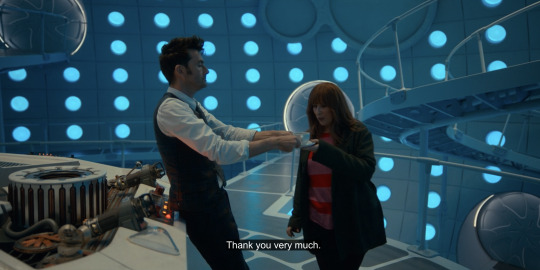

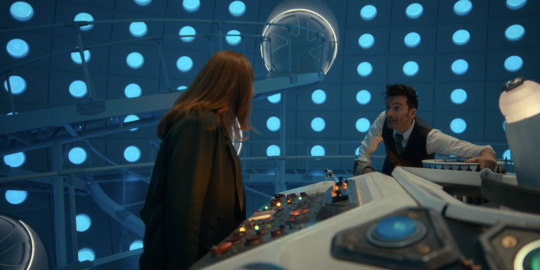
Well, he is trying to impress her, to get her to travel with him again – like he tried to do by using the TARDIS to make it snow at Christmas the first time he asked her to travel with him.
But he got that attempt wrong. Donna doesn't like Christmas, and the Doctor having the power to make it snow "scared her to death."


A cup of coffee, just how she likes it, is (on the surface of it) a smaller gesture to show that he remembered the little details about her. A cup of coffee is what brought them together all those years ago.
But it's what Donna told the Doctor about what Lance making her that cup of coffee meant to her that the Doctor really listened to and remembered.
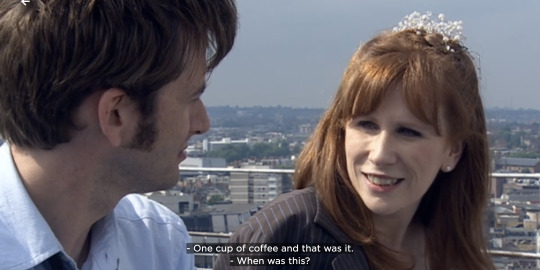


"I was temping. I mean, it was all a bit posh, really. I'd spent the last two years at a double glazing firm. Well, I thought, I'm never going to fit in here. And then he made me a cup of coffee. I mean, that just doesn't happen. Nobody gets the secretaries a coffee. "And Lance, he's the Head of HR, he didn't need to bother with me. But he was nice, he was funny. And it turns out he thought everyone else was really snotty too. So, that's how it started, me and him. One cup of coffee, and that was it."
Donna fell in love with Lance because he made her a cup of coffee. So used to being unnoticed and uncared for, something as simple as an 'important' man taking the time to make her a cup of coffee meant everything to Donna.
She thought it was a sign that he was kind, that he was nice. She thought it was a sign he noticed and cared for her.
And the Doctor sees how it devastates her to learn the real reason why he was making her coffee was to drug her for his own ends. Despite their differences, he's gentle when he breaks it to her. And it connects her to him in a shared grief.
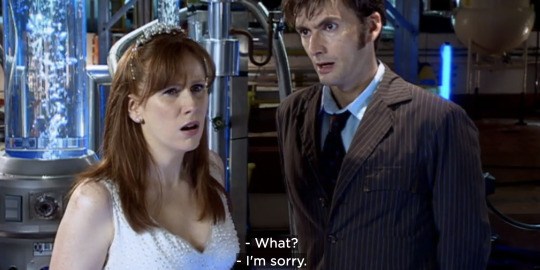

So when the Doctor makes her a cup of coffee after she regains her memories, he's not just telling her that he remembers the little details about her like how she likes her coffee, but the big things too.
He's showing that he sees her, that he cares about her thoughts and feelings, that he wants to care for her after all these years when he couldn't. That he knows how important this is to her.
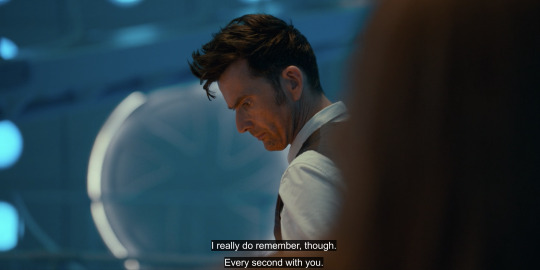
But that's not all.
In the alternative timeline, Donna never meets Lance. And yet, when she is upset, and afraid, she asks Rose Tyler for a cup of coffee. Steam rises from her mug as they stand around the console inside the dying TARDIS, and have the most honest conversation they've had yet about the Doctor and their feelings towards him.


In the proper timeline, the person we see Donna drinking coffee with is Wilf. In moments of joy and moments of upset they bond over coffee. Before she finds the Doctor again, Donna brings Wilf a thermos to escape Sylvia's criticisms.
Wilf is the only person in Donna's life who she can be herself around, who has unconditionally cared for her, and who she takes joy in caring for back.
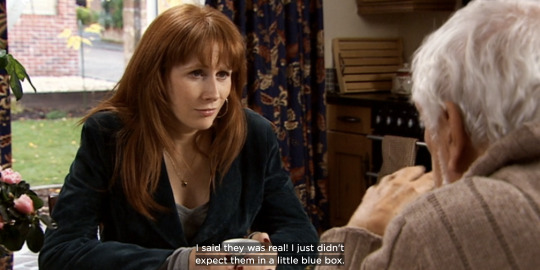
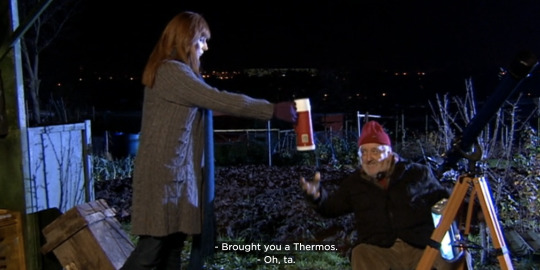
Even in the alternative timeline, Wilf has held onto not only the telescope but the exact same thermos Donna brings him coffee in when he's up on the hill.


For the Doctor to remember how she takes her coffee, we know they must have had moments together like this off-screen too.
So when the Doctor makes her a cup of coffee, just how she likes it, he is communicating he remembers not just the small details of her but that he remembers all these things that she associates with making someone a cup of coffee – kindness, acceptance, being noticed, caring for someone and being cared for, home, and family.
It's possible, for the Doctor, there's an apology in that cup of coffee too.
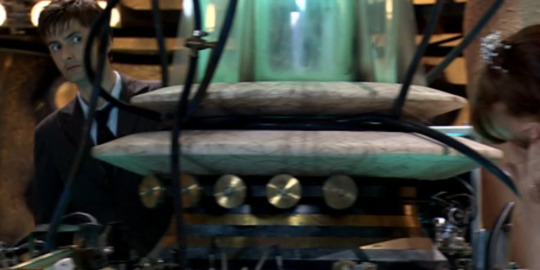
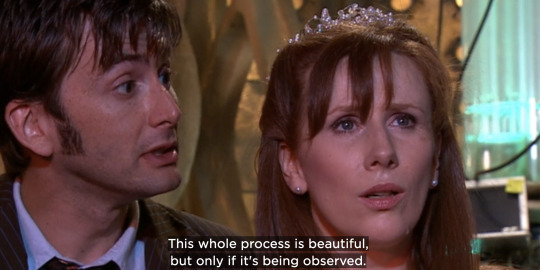
But wait, there's still more.
Did Donna spill the cup of coffee on the console on purpose?
The slight of hand was rather obvious. And it came at a time when Donna was trying to convince him not to leave her, to come back home to her, if only just for a visit.
He'd not said no, but she'd easily seen through him the first time he lied about coming inside to have dinner with her family that first Christmas, and likely saw through him again – the avoidance of eye contact, fiddling with the TARDIS, the wane "yeah, maybe."


She also rather clearly wanted to go on another trip with him (she never wanted to stop in the first place), and was only saying no because of her obligations to her family. It's possible she was buying time by spilling the cup of coffee – just one more than one last trip, without it being her "fault."
She had, after all, just dropped a cup of coffee on a computer and lost a job she'd probably hated, knowing Donna. And before things had gone really wrong, she'd definitely been enjoying herself.
It's also possible she's still quite angry with the Doctor, but unable to fully verbalise this yet.
He connects the cup of coffee to remembering every detail of her. She has not been able to remember any detail of her life with him. The last time they were standing around the console together, he took her memories against her will. He says it killed him; but she – or that version of herself, the one she actually liked – was arguably the one who was killed.
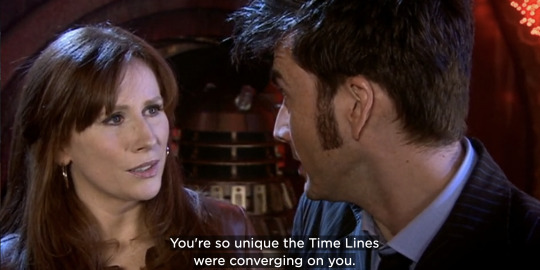
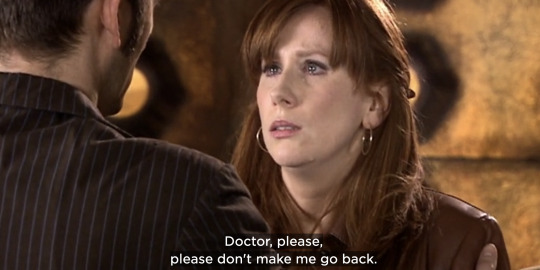
And she might be remembering Lance, another man she truly loved and trusted, and how a cup of coffee seemed like a kindness but was in fact a lie, a violation.
The Doctor quite possibly also suspects something like this is what might have happened, given his level of anger at her.
Despite the fact that this Doctor is more able to admit his feelings, we don't see what happened between them when he took her memories ever properly resolved in words.
Instead, there are a series of proxy arguments that stand in for it – Donna's anger that she gave away all her money because of him, that he sees taking the slow path, living a life day after day as such agony when he made her do it, his anger at her faith that he will know how to defeat the Toy Maker.
And their most emotional proxy argument of all – who is at fault for stranding them at the edge of the universe? Is it Donna, who spilt the cup of coffee, or the Doctor, who she couldn't stop from wandering off?

Thematically, however, there is some resolution. The Doctor lets Donna decide to regain her memories, even if it means she'll die. The Doctor knows Donna enough to save her from being left to die alone, even if it is at the very last moment. The Doctor admits he used to think he knew everything, but now he knows he doesn't.
Donna gets to tell him it's not all about him saving her, gets him to stop, finally gets him to come home with her.
And in their last scene, it's the Doctor who is having the cup of coffee.

1K notes
·
View notes
Text
David Tennant’s performance in Much Ado About Nothing is perfect but specifically his delivery of “For man is a giddy thing, and this is my conclusion.” where he looks straight at Beatrice with all the adoration in the world and it becomes a declaration that she is his conclusion. Beatrice is the whole point purpose and end of all. This moment is the rest of his life laid out ahead of him and he is so completely content with his choice.
It’s such a beautiful bookend because this is a play. Benedick is a character and his marriage to Beatrice is literally his conclusion. It’s the end of his story. But it’s also an assertion of the characters’ love and devotion in a beautiful poetic metaphor, and not only is it one of the lines that solidified the 2011 production as my favorite, but it’s also just one that I think about and it scrambles my brain a bit with its sheer romanticism.
194 notes
·
View notes
Text
You know what's so devastating to me about "God that I were a man"? It's the way that in this situation, Beatrice is not exceptional. In the first acts, she appears to be exempt from the gender roles that everyone around her complies with: she has avoided marriage so far, and she has license to playfully criticize and reject being "over-master'd with a piece of valiant dust" (2.2.55-56). She even suggests to Hero that she claim some agency over her engagement: "it is my cousin's duty to make curtsy, and say, 'father, as it please you.' But yet for all that, cousin, let him be a handsome fellow, or else make another curtsy and say, 'father, as it please me'" (2.1.48-51). Beatrice has carved out an existence for herself that everyone else tolerates; her wit allows her to live outside of people's expectations of womanhood.
But Beatrice is not exempt from being a woman. When it actually matters, when Hero is disgraced by powerful men with no regard for her wellbeing or humanity, Beatrice can't do anything about it. And "God that I were a man" is so painful because it reminds us--and Benedick--that no matter how transcendent Beatrice appears to be, she is still constrained by her role in Messina's society. Back in act one and act two, the reason that she was allowed to poke fun at men wasn't that she couldn't be stopped; it was that it didn't matter. She has no actual power to change the order of things, and so her verbal sparring is not a threat.
(An aside: I think that Benedick is taken aback by "God that I were a man" because this has never really occurred to him. He sees Beatrice as his intellectual equal, and he has watched her carve out space for herself effectively (they know each other of old). In the 2011 production with David Tennant, the costuming and acting choices show how Benedick starts actively performing masculinity only when he accepts Beatrice's request to kill Claudio--when he has to "be a man for [Beatrice's] sake" (4.1.314). In the first acts, he wears tight clothes, a crop top, and a miniskirt. From the wedding on, he wears his military uniform and then a suit. His body language also changes; he abandons physical comedy, stands tall, and emotes less when he speaks to Claudio and Don Pedro. He wields his masculinity as a weapon because he now realizes it's a weapon that Beatrice cannot wield herself.)
The crashing realization of Beatrice's limits is so devastating to me because it's so familiar. I can only speak from experiences I've had, but as a queer woman I know that tolerance is different than empowerment. That having grown up evading dating and romance with made-up excuses to hide my queerness, having realized the extent of the misogyny in an organization I cared about and having grappled with how that misogyny prevented me from effecting change, being allowed to exist is not the same as being able to participate, to make things different. God, that I were a man. I would eat his heart in the marketplace.
3K notes
·
View notes
Text
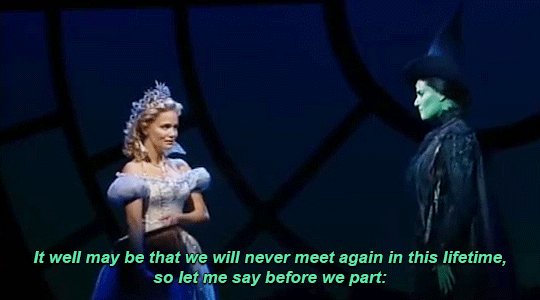
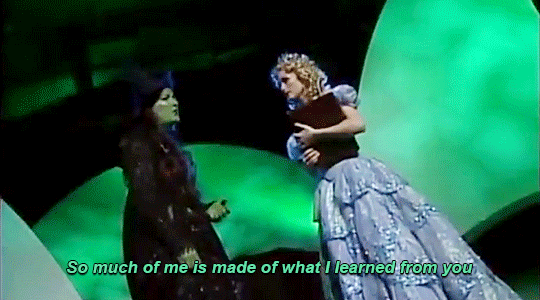


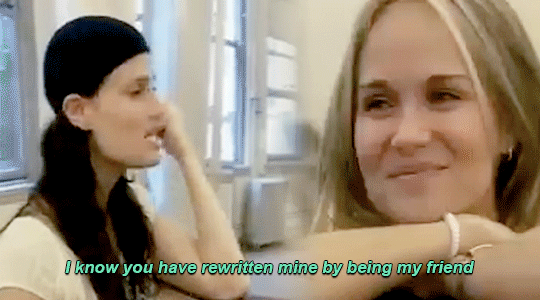

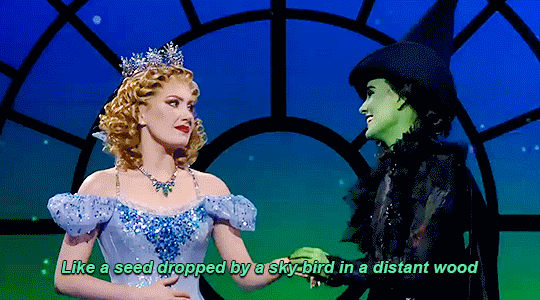

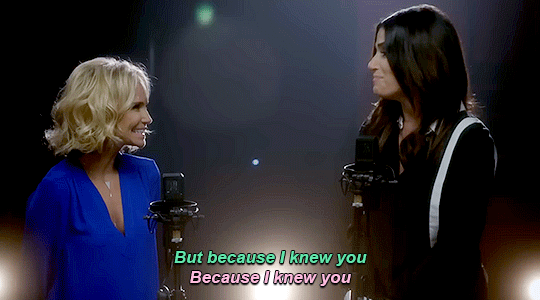
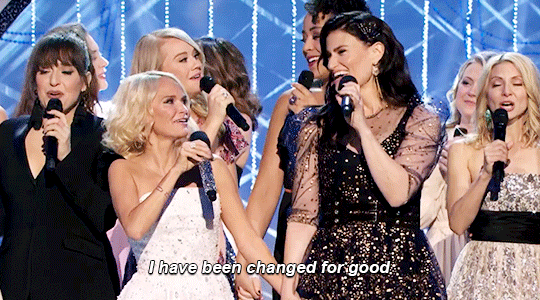
i know i'm who i am today because i knew you 20 YEARS OF WICKED: FOR GOOD idina menzel & kristin chenoweth • ana gasteyer & kate reinders • alyssa fox & mckenzie kurtz • christine dwyer & jenni barber • idina menzel & kristin chenoweth • stephanie j block & kendra kassebaum • alyssa fox & mckenzie kurtz • lindsay heather pearce & brittney johnson • idina menzel & kristin chenoweth • idina menzel, kristin chenoweth, & various elphabas and glindas of broadway
4K notes
·
View notes
Text
there's something to be said about wicked's opening and closing numbers both ending with a high cry of "WICKED" and while at the start of the show glinda is singing it with the ensemble, at the end she's silent on that final word. she's said her piece, she's told them the story and they're still crying out that elphaba is wicked, and this time glinda can't bring herself to join, too hurt to keep pretending.
instead, the last thing she sings is a reprise of for good, showing just how much elphaba did change her. she's not willing to join the crowds anymore.
also by not having glinda sing the last words, the narrative further isolates her from the rest of the world. she's truly and utterly alone.
2K notes
·
View notes
Text
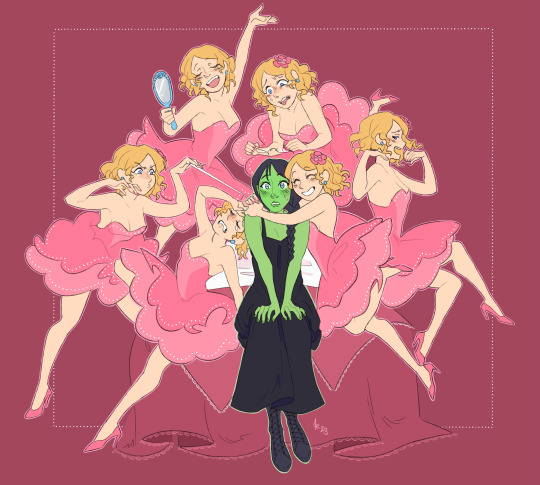
Now that I’ve chosen to become a pal, a sister, an advisor, there is nobody wiser, not when it comes to… Popular!
3K notes
·
View notes
Text
i'm still thinking about wicked's finale. glinda's last spoken dialogue is "i'd like to try to be glinda the good" because that's what elphaba wanted for her, to do everything elphaba couldn't do and make the world a better place. she's carrying out elphaba's wish and in a way honoring her, even when that's not what either of them want, even when the only thing they both want is to be together again.
and elphaba DOES want to be with her again. her final dialogue is literally "i only wish that glinda could know that we're alive." and the last thing she sings is the reprise of for good. even in the last moments of the show she's thinking about glinda. only glinda.
then glinda starts the reprise, and elphaba answers. they think about each other until the end. their very last lines are for each other.
956 notes
·
View notes
Text
thinking constantly how glinda was willing to sacrifice her own reputation and basically everything to try and clear elphie’s name with the ozians and only doesn’t fully do it because elphie loved her too much to allow that and made her promise she wouldn’t 💔
and even despite that, while it’s subtle enough that the ozians don’t turn on her, glinda still tries to humanise elphie a little bit to them bc she can’t let them keep saying that stuff about her best friend without saying something.
181 notes
·
View notes
Note
I love your thoughtful SoC meta! I would love to know your thoughts on Kaz and Jesper’s relationship. Specifically, I adore Kaz but one thing in particular that always seemed so dark to me was that he enabled Jesper’s gambling addiction even though he obviously does care about him. Kaz is obviously willing to do a lot of fucked up things in service of his goals, but this one in particular, toward his own brother figure, I find sad. It’s kind of addressed during their fight at the end of CK but still feels a little unfinished.
I love Kaz and Jesper's relationship. There's sooooo much to dig into there (way too much for a single meta); it's super juicy and complicated, and one of the best complexities of it is that they often enable and feed off of each other's trauma. The pre-canon status quo is a situation where Kaz and Jesper are, in many ways, using and abusing each other as a way of avoiding dealing with their own trauma. It's a fascinating push-and-pull dynamic because neither of them are pushovers and yet neither one is particularly interested in facing their Issues™ head-on, and they both seemingly recognize that in each other and give each other an uncharacteristic amount of grace in helping the other avoid dealing with it.
In Kaz's case, that most often looks like enabling Jesper's gambling addiction and then repeatedly bailing him out of trouble under the justification of "he's loyal and competent, it would be wasteful to let the other gangs kill him." In Jesper's case, this looks like ignoring Kaz's countless and extremely obvious issues in favor of playing the loyal second. Basically, it's not just Kaz enabling Jesper's gambling addiction; it's also Jesper enabling Kaz's unhinged ruthlessness with little pushback other than a few snarky comments.
They also project a lot of their own issues onto each other! Kaz pushes Jesper away in part because he's projecting the grief and blame he feels over Jordie's death onto Jesper, but Jesper is using Kaz's ruthless pragmatism to escape the crippling disappointment of returning home to face his father's judgement for being a college drop-out, gambling addict, and gang member. And Kaz withholds praise and verbal declarations of trust from Jesper because he hates acknowledging that he cares about people, but Jesper uses Kaz's emotional detachment as a crutch to avoid dealing with his own commitment issues by pining after a boy he knows will never reciprocate his advances. This status quo is, of course, insanely unhealthy for both boys long-term, but where would we be if any of the Crows actually dealt with their issues in a healthy way?
That dynamic, imo, is also only possible because Kaz and Jesper have known each other for longer than anyone else in the main crew; Kaz may have let Inej in further, but he let Jesper in first. As far as we know, Jesper is the first person Kaz genuinely lets past his mile-high walls since Jordie died...but he very deliberately holds him at arms' length in a way that he does not with Inej (something that Jesper notices and is jealous about!). Being "the first" in this case unfortunately comes with a lot of baggage, and Kaz and Jesper would both lowkey rather die than talk about how much they care what the other thinks of them.
Kaz clearly didn't recruit Jesper looking for a friend or someone who reminded him of his dead older brother; he recruited him because he saw someone with a useful skillset who he preferred to be at his side rather than in a rival gang or dead in the canals. It's to Jesper's credit that he managed to break through those walls anyway, but there's only so much he can do in the face of Kaz's armor. And like Inej, Kaz's closed-off personality and actions hurt Jesper repeatedly. But he stays anyway, because he (like Inej) sees the boy underneath the mask that Kaz wears and cares a little too much to let him go:
“He wouldn’t—” Jesper stopped short, and then he laughed. “Of course he would.” Jesper flexed his knuckles, concentrated on the lines of his palms. “Kaz is…I don’t know, he’s like nobody else I’ve ever known. He surprises me.” “Yes. Like a hive of bees in your dresser drawer.” Jesper barked a laugh. “Just like that.” “So what are we doing here?” Jesper turned back to the sea, feeling his cheeks heat. “Hoping for honey, I guess. And praying not to get stung.” Inej bumped her shoulder against his. “Then at least we’re both the same kind of stupid.” “I don’t know what your excuse is, Wraith. I’m the one who can never walk away from a bad hand.” She looped her arm in his. “That makes you a rotten gambler, Jesper. But an excellent friend.” “You’re too good for him, you know.” “I know. So are you." -Ch. 17, Six of Crows
Kaz is unused to verbalizing the trust he places in others and actively in denial about how much he cares about them until Crooked Kingdom; he spends his time deliberately being cruel and pushing people away even as he proves over and over again that he doesn't actually want them to leave him. This casual assholery hits those closest to him (Inej and Jesper) the hardest because they are clearly trusted with his life but not with his heart, and that hurts them both.
For Inej, resolving that behavior looks like giving him an ultimatum ("I will have you without armor or I will not have you at all") and telling herself to walk away unless he meets her challenge. For Jesper? That looks like duking it out on top of the Geldrenner when they're both at rock bottom, because of course that's the only way either one of those boys is ever going to verbalize the tension that underlies their relationship. There's just a lot of baggage and mutual toxicity and unsaid words that neither of them are very interested in dealing with until everything comes to a head during the Clocktower fight.
I think we also forget that the Kaz-Jesper dynamic we see in the majority of the duology is not their normal dynamic: it's how they interact when Kaz is mad at Jesper. And a mad Kaz is, within the scope of canon, a pretty cruel Kaz, which is something that I think a good portion of the fandom likes to handwave away in favor of pointing towards Kaz's active attempts to be better in the back half of the duology.
Ultimately we only see the "normal" Kaz-Jesper dynamic for the first 12 or so chapters of Six of Crows (when the Dock Fight/Eyeball Incident happens) and the last few chapters of Crooked Kingdom. Those chapters are a really interesting look into what that relationship looks like when they're on good terms. It's clear that they're good friends, trust each other a hell of a lot, and joke around with each other quite a bit (the "saves ammo" joke in the parley chapter, their interactions during the Hellgate breakout, the "man with a knife!" "man with a gun!" exchange immediately after Kaz throws Oomen overboard, etc), but we also see the stress points: Jesper getting mad at Kaz for not telling him about Big Bolliger's betrayal, Kaz sending Wylan with Jesper during the prep chapters to keep an eye on him, and Jesper's bee and honey conversation with Inej on the Ferolind, for example.
These stress points are what fracture and crack in the aftermath of Jesper accidentally alerting the other gangs that they were headed out on the Ice Court Job and nearly causing Inej's death, and further buckle under the stress and pressure that Kaz and Jesper deal with during the following month and a half: the Ice Court job, Van Eck kidnapping Inej on Vellgeluk, Colm showing up in Ketterdam, and the Sugar Silo/Auction scheme.
In this way, I think Kaz enabling Jesper's gambling addiction is less about Kaz being actively cruel towards someone he sees the ghost of his brother in and punishing Jesper for the sins he percieves Jordie to have made (which is also true, and a meta for a different time!) and more about the weird balance of toxic mutual leniency Kaz and Jesper have allowed the other to provide for them for over two years...and how that leniency breaks down once it's not just Kaz's life or time on the line when Jesper fucks up.
Put more succinctly: for a long time, Kaz and Jesper existed in a toxic balance of enabling each others' worst impulses and behaviors, which was only able to be verbally addressed when they were both at rock bottom, desperate, and seemingly had very little left to lose. This conflict is somewhat addressed and resolved in the conversation where Kaz refuses to give Jesper the last of the parem and offers up a tiny bit of information about Jordie—showcasing his own growth and how he's finally trying to break the cycle by refusing to enable Jesper's self-destructive tendencies—but that level of tension is unable to be properly resolved in one single blowout argument. And I think it's deliberately left a bit unfinished because neither of them are really in a place where they're ready to address everything they've left unsaid for so long, even in the epilogue chapters.
However, we do see the beginnings of that reconcilitaion (Kaz asking Inej to tell Jesper that he's "missed around the Slat") and the story ends on a hopeful note regarding Kaz's commitment to removing his armor, which implies a lot about the resolution of that dangling thread. And of course, we know that by Rule of Wolves they're back to being thick as thieves and fucking around as usual, so clearly they hashed it out at some point in the in-between (and personally? I don't think it took either of them very long after the CK epilogue chapters to do that hashing out).
tl;dr: I love it when two traumatized and emotionally constipated teenage boys use each other to avoid facing their own personal problems and then get into a fistfight to avoid talking about how much they care about each other. Top-tier dynamic. Chef's kiss. I could talk about them for hours.
208 notes
·
View notes
Photo
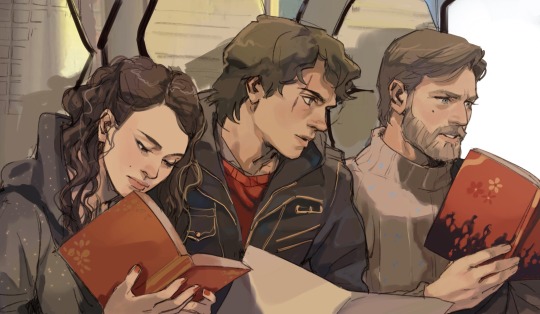


Modern Star Wars by @thisuserisangry
#star wars#padme amidala#anakin skywalker#obi-wan kenobi#han solo#leia organa#luke skywalker#rey skywalker#finn#poe dameron
90K notes
·
View notes
Text
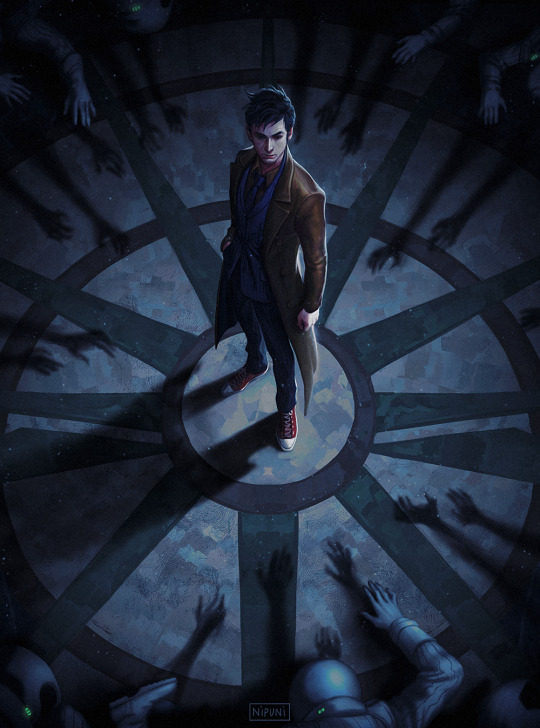
Silence in the library
A speedpaint video of this will be available at my Patreon on february 1st!
8K notes
·
View notes
Text
I think there's actually something really profound in Donna's 'missing everything' gag. Like, yes, it's objectively funny that this woman has somehow missed every alien invasion in the entirety of her time on Earth.
But there's more to it than that. She's the most compassionate companion, the most down to Earth as the saying goes. She sees things that others don't. Like the missing sick records, the way others are treated, Martha's ring. Sees the inside of the Tardis before she sees the outside. And perhaps most importantly, she doesn't see The Time Lord - that big otherworldly figure. She just sees the Doctor. Sees his need for true companionship, his need for guidance, his need for someone to carry a burden he is being crushed under.
She misses the big things, yes, but in exchange she is so wholly, beautifully immersed in the small things no one else sees.
6K notes
·
View notes
Text
Rose Tyler's Wardrobe, Series 1
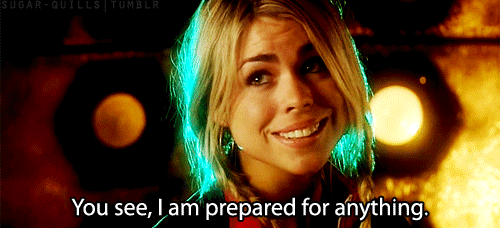
Hi everybody! It’s been a long, long, long time since I wrote a Doctor Who costuming post. I did Martha. I did River. And now it’s Rose’s turn. Well, for Series 1 at least. Series 2 and 4 will get their own posts. :)
I’m excited to do Rose, because she is quite a different creature than Martha or River. Style-wise, Martha was fashionable and neat and as tied together as an upper-class med student can be; River was full of swag and style and time travel. You look at either of their wardrobes and you go “ooooh” and “I wanna wear that!” And you get that reaction because the costumer wanted you to admire these characters and recognize whatever it is about them that gives them that style—in Martha’s case, that’s her elegant background, and in River’s, it’s her habit of living life to its absolute fullest degree. In more condensed terms, the very fact that they’re well-dressed relays something about them as characters, which is the point of costuming.
Is Rose like that, all stylish and gorgeous and decked out in cool textile items? Noooo. Rose is not much of a clothes horse—she gets some sweet outfits, but unlike Martha and River, those outfits are little gems sprinkled in among 2005 hoodies and jeans and godawful bags. And that’s actually really, really special, because it meant the costumer abandoned fashion and style and the temptation to dress Billie Piper as beautifully as possible to be real with the viewer, to have every piece of clothing count not for its aesthetic experience but for its ability to tell you who Rose is, with every grimy shoe and synthetic thread. Rose’s costuming is pure visual storytelling, and I love it. I love it.
With exceptions, of course. Because we all make mistakes.
So! With my gushing out of the way, let’s get on. Guess what time it is? PAJAMA TIME.

Yeah, no, I’m not going to analyze a striped tank top and white sweats as symbolizing Rose’s imprisonment within her ideal of self and her fundamentally pure soul. They’re pajamas, guys. Pajamas some costume person yanked off a rack and said “uh yeah this might be Billie’s size.” It’s a dull start, but don’t worry; it gets so much more interesting.

See???? Interesting! The look you see above—worn pink hoodie, cheap pink tank top, shapeless jeans, oddly loud messenger bag and a little Ninth Doctor to hold in one hand—is what Rose is wearing when we start spending any large amount of time with her. Now, I can hear you sighing: this outfit isn’t very glamorous, is it? I mean, Martha was fashionable. River was stylish. But this is so…..ordinary.
And you’re right: as fashion, as style, this is kind of a disappointing outfit. But to tell you about a character using only clothes? It’s AMAZING. Take a long look at it. What can we figure out about Rose, from one outfit?
Actually quite a lot.
Do you see how it’s a couple different shades of pink? This shows you the logic Rose uses when she puts herself together in the morning. While Martha has a solid color palette of reds and golds that she’s layered together in a way that suggests she learned how to look like a class act by osmosis, Rose very much got dressed by grabbing clothes from a drawer. There is a logic to it—pinks go together, right? and jeans go with everything?—but it’s not the elegant color palette Martha would have been acclimated to in her upper-middle-class household. Rose tried, but she didn’t think of going out of her comfort zone of pinks, or of making any fashionable combinations, like having her shirt pick up some of the colors from her bag. She had to get to work, man, she didn’t have time for that. (in technical terms, Rose is using a monochromatic color palette, while Martha uses a more grown-up analogous one. if color palettes are your thing, you get me).
it’s youthful: again, pink, and also the loose-fitting hoodie. She’s not dressed like a Young Adult Person with Career Goals Who Drinks Red Wine And Has a Resume. Rose still looks a little like a kid (also super comfortable).
it’s very, very casual—I’m kind of surprised even a shopgirl was allowed to be this dressed down at a department store, but I haven’t been in a big one in a long time so who knows? Rose is not here to impress anybody, nor really herself.
it’s not high-quality stuff, at all. It’s going to wear out in less than a year; you can almost see through the sweater, it’s so used. This kind of thing shows you that Rose can’t afford the best clothes, and also doesn’t care enough to spend the money she does have that way.
They’re working-class clothes: dependable, comfy, don’t stand out much. Kinda like Rose, when she meets the Doctor.
So already in one outfit, without having to know anything else about her, you know a little about Rose: she’s not the Anna Wintour of the Powell Estate, she’s not rich, she’s not dressing like she expects a lot out of her day—dressed like that, I doubt she even expects a promotion. It all reflects where Rose is going at this point: nowhere.

Good point, Jackie. And happen it does: the Doctor comes back. Rose, again, is not prepared to wow in the style department. Look at her.
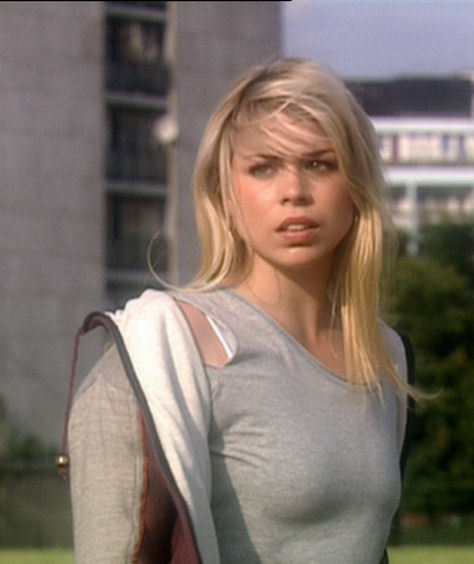
I want to applaud the costume department for getting the tank-top-and-crappy-hoodie-with-bra-slightly-showing look down perfectly, because this is exactly the sort of thing normal unemployed nineteen-year-old girls wear. Like, wow. Stop spying on me, show.
Fortunately, Nine is not a fashion critic and takes Rose on board despite her tank tops. They go to the end of the world, and it’s very glam, and Rose zips up her hoodie and calls it good.

God, she’s so normal-looking. I don’t think I’ve ever seen a show where the fashion was this level of accurately boring. Is the show whacking you over the head enough with Rose being normal yet? Is this post?
Just to whack you over the head with it a bit more, Rose is predominantly wearing very dark, ordinary, dull grays, which reinforces how very ~NORMAL~ she is. Considering that these sorts of things were what companions were wearing shortly before Who got kicked off the screen in the 80s, I kinda can’t blame the costumers for veering this hard into Smoll Ordinary Nobodyville.
Though she is still the Smollest Ordinariest Nobody of All, note that Rose is already wearing a deeper shade of pink/maroon than when she was folding shirts and watching Mickey dance. The symbolism, guys! Rose is already deepening and darkening as a person! Ooooh!
Even better, though? Look at Nine’s shirt. Look back at Rose’s hoodie. One adventure in and they’re matching, guys.

Literally one episode with these two and they’re already so adorable. How. Why, show. Why.
Keep reading
1K notes
·
View notes
